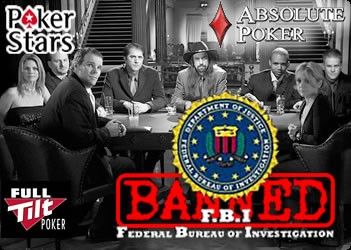

An article concerning the banning of on-line poker in the United States, and the seizure of domain names and bank accounts by the US authorities.


If there is one thing most people can’t refuse, it’s free money, even if they have to work to get it. Every night on Full Tilt Poker there is a HORSE freeroll, ie a tournament of five mixed poker games that is totally free to enter; it has a $150 prize pool split between 45 players. Normally the tournament is full up, normally, all freerolls are. Normally, all 7500 seats would be filled well before the close of registration, so if you wanted to play, it was advisable to register ASAP. Last night, May 7, there were 5529 runners. A little mathematics reveals this is 73.72% full.
This might indicate that Full Tilt Poker and by implication PokerStars and all other poker sites in this global business had lost around 27% of their players and revenue after the FBI and the DOJ branded the honest and innovative businessmen who run them criminals and money launderers, a combination of Al Capone and Pablo Escobar. The reality is probably a lot worse. Every night, Full Tilt runs a $5 Stud Hi Lo Tournament; although not immensely popular, this usually had a fair turn out, often over a hundred; on April 29, it had thirteen runners, more often than not, it is now cancelled.
Freeroll tournaments on PokerStars are also far from full, and on both these sites, there are fewer cash game players. Full Tilt and PokerStars are two of the biggest; if their traffic and revenue is down, so too are those of the smaller sites. So what are they doing on the legal front? According to Anupama (no last name) of Party Poker’s Customer Service:
“Based on current U.S. legislation, since 2006 we have stopped accepting real money wagers and deposits from players who are either registered with our cashier with a U.S address or who are logging in to our sites from a U.S. Internet provider.
Any player accessing our Real Money games from the U.S. will not be able to make a deposit or wager. Players registered with an address outside the U.S. will still be able to wager and make deposits when accessing our games from outside the U.S....
We are determined to meet this challenge, and although we deeply regret having to close our U.S. business, we must comply with this law. However, please know that we are actively working toward a regulated environment for online gaming in the US.”
Paula (no last name) of Full Tilt Poker Support said: “We have compiled a list of the most frequently asked questions we have received from U.S. players, which may address some of your questions or concerns.” She added the FAQ will be updated when available, but the bottom line is that US residents cannot play on Full Tilt, even if they are travelling or based temporarily overseas, nor can foreign tourists to the US. Everything else, bonuses, purchases of merchandise from poker sites, etc made by US players, has been put on hold.
While the big sites appear to be playing it low key, American poker players are positively bullish. Although it was founded in 2005, a year before the Unlawful Internet Gambling Enforcement Act came into force, it is clear that America’s on-line poker players knew what was in the wind, and were determined to nip it in the bud. The PPA has some heavyweight support; its Chairman is former US Senator Alfonse D’Amato, and its Executive Director is John Pappas, who “cut his teeth in Washington politics straight out of college [and] worked for nearly six years with his hometown congressman, John Shadegg from Arizona.”
The Poker Players Alliance is based in Washington DC, the ideal home for any lobbying organisation in the United States, and lobby it does, and it intends to step up the pressure. In the wake of what it calls Black Friday, it issued a forthright statement:
“On behalf of the millions of poker players across the country, we are shocked at the action taken by the U.S. Department of Justice today against online poker companies and will continue to fight for Americans’ right to participate in the game they enjoy.”
The PPA claimed too that seventy thousand letters and e-mails had been sent to government officials, and thousands of phone calls made condemning the actions of the Department Of Justice.
On May 23-24, around thirty PPA members will be lobbying Congress to rescind the legislation that has made their favourite pastime a crime, and “to establish regulated online poker in the U.S, this year.” In the words of Alfonse D’Amato: “Our members are anxious to get to Washington and tell their lawmakers to restore their freedom to play poker on the Internet”.
Libertarians too are concerned about the assault on on-line poker. On April 28, Jeffrey Tucker of the Mises Institute conducted an on-line interview with professional poker player Robert Fellner who said the Government had acted in violation of international law by seizing the sites’ domain names and freezing their bank accounts adding that it was an arrogant display of arbitrary power.
Few poker players and no Libertarians would argue with that, but in spite of the heavyweight lobbying on behalf of a game popular with millions of Americans, the prospects for a total repeal of the legislation do not look good. In this connection, it should be borne in mind that the prohibition of alcohol was arguably even more unpopular. Alas, the Volstead Act was passed in October 1919, and was not repealed until 1933.
[The above article was published originally May 9, 2011. Neither of the photographs added were supplied by me, and have been used in other articles, including (the first of the above) in US And World Poker Sites Unfazed By FBI Assault.]
Back To Digital Journal Index